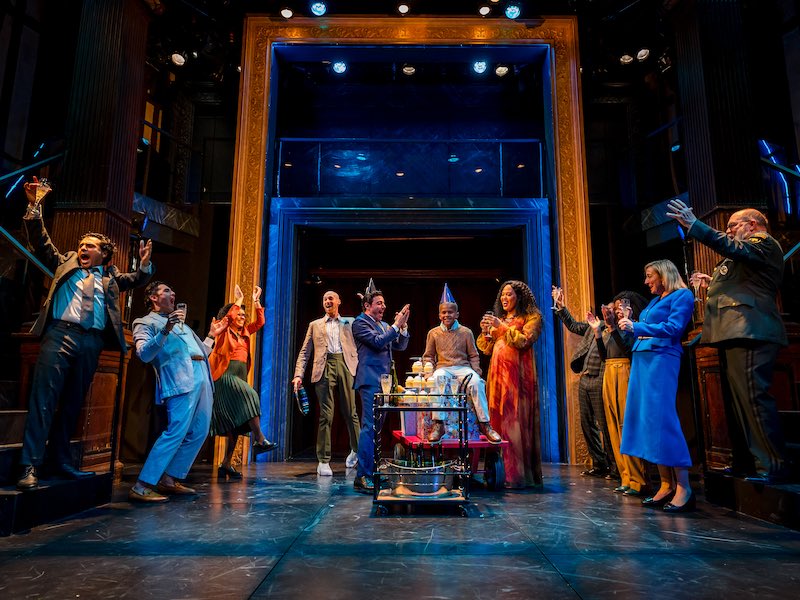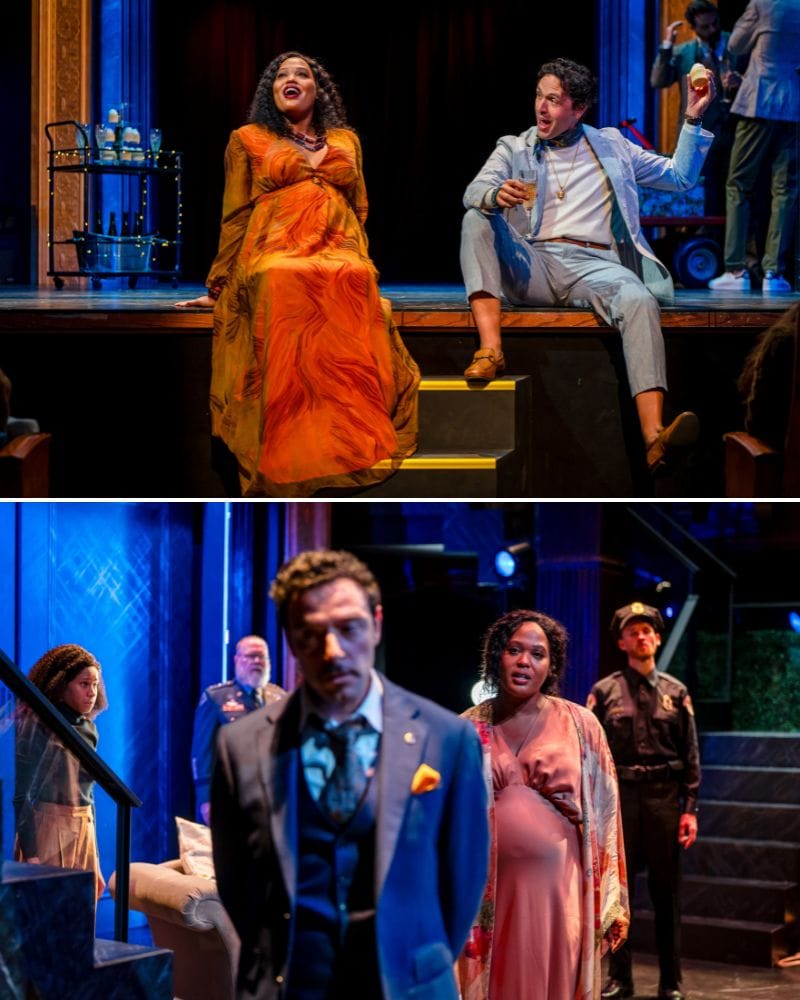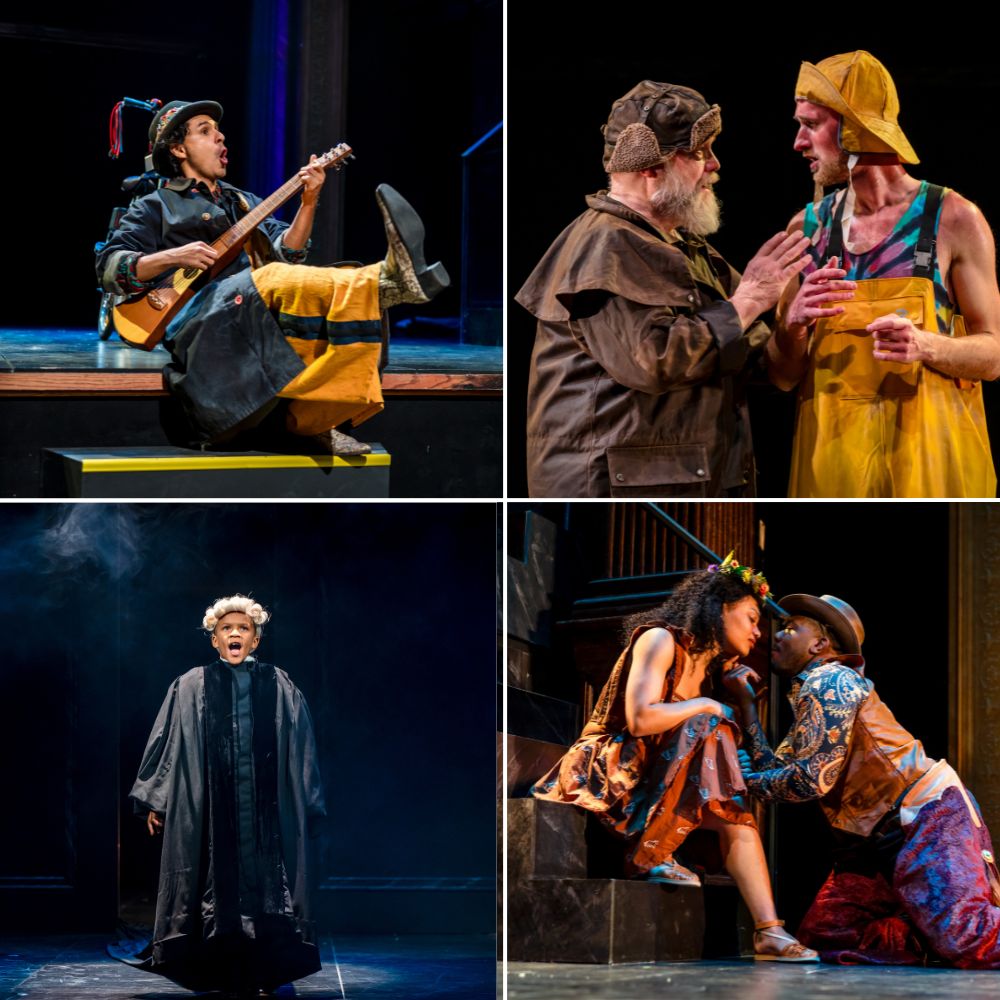Folger Shakespeare Theatre’s production of The Winter’s Tale, one of William Shakespeare’s most enigmatic works, opens with a lavish birthday party. As artistic director Karen Ann Daniels proclaimed in her opening night speech, a birthday party is a fitting way to welcome audiences back to the Folger’s newly renovated space, part of a massive capital project that will conclude when the famed Folger Shakespeare Library reopens in the spring. Choosing The Winter’s Tale, with all its wonders and warts, is also an indication of the challenges the company is willing to take on with gusto.

The Winter’s Tale occupies an awkward place in Shakespeare’s oeuvre as even a cursory summary would indicate: The birthday party in question is for young prince Mamillius (Richard Bradford/Clarence Payne), son of King Leontes (Hadi Tabbal) and Queen Hermione (Antoinette Crowe-Legacy) of Sicilia. Present at the occasion is Polixenes (Drew Kopas), the charming King of Bohemia. When Leontes spies his pregnant wife speaking in furtive whispers to Polixenes, he grows mad with misplaced envy and suspicion. Despite the counsel of noble Camillo (Cody Nickell), Leontes plots Polixenes’ downfall, only for Camillo to secretly direct Polixenes to safety. Hermione, meanwhile, is placed under house arrest, during which she gives birth to a daughter whom Leontes deems to be Polixenes’ issue. Ignoring the judgment of the oracle of the gods and the pleas of Hermione’s lady-in-waiting Paulina (Kate Eastwood Norris), Leontes orders that the girl be disposed of, and Hermione put to death. Tragically, young Mamillius dies soon after; his demise brings Leontes back to his senses, but not in time to save his wife from seemingly dying of a broken heart. Meanwhile, with the aid of another of Hermione’s ladies-in-waiting (Sabrina Lynne Sawyer), steadfast Antigonus (Stephen Patrick Martin) sees to the unwanted daughter’s new life in Bohemia, where she is adopted by a kindly Shepherd (also Martin) and his buffoonish Son (Nicholas Gerwitz). Sixteen years pass, during which the castaway daughter Perdita (Kayleandra White) has grown into the apple of the eye of Prince Florizel (Jonathan Del Palmer) of Bohemia, much to the chagrin of his father, who, not knowing Perdita’s true identity, thinks his son has fallen for a lowly commoner. With the help of the ever-accommodating Camillo, and amid the schemes of a charming vagabond named Autolycus (Reza Salazar), the young couple makes a break for Sicilia, where the promise of a reunion awaits.

The Winter’s Tale is effectively a tragicomedy: grave in its overarching subject matter but leavened by extended comic sequences and a happy ending that is awfully contrived. (As a patron leaving the venue behind me opined, it’s as if Shakespeare was working on a deadline.) It’s a credit to the Folger and to director Tamila Woodard that these disparate elements are tackled head-on. Woodard deploys the Folger’s full stage and center aisle to good effect, embracing the space as she tracks the threads of this tale. Raul Abrego Jr.’s set, dominated by a pair of sliding doors flanked by winding staircases, suits the grandeur of Leontes’ chic palace and makes adequate space for affairs in the more rustic Bohemia. The dexterity of the setting is matched by Sarah Cubbage’s costumes, which seamlessly accommodate everything from Hermione’s regal evening wear to Autolycus’s vagabond attire, glittering with bits and bobs.
By and large the cast, though occasionally rendered short of breath as they scale the Bard’s winding verbal passages, take to the story’s many shifts with ease. The especially steady hands of Nickell, Norris, and Martin suit their roles as the play’s facilitators and expositors. Salazar, meanwhile, enlivens the crowd with a cheeky (if overlong) musical call-and-response routine, and Del Palmer charms and amuses as the lovesick Florizel. Overall, the ensemble deserves credit for imbuing the Sicilian scenes with pathos and the country bumpkin Bohemian scenes with mirth; though the latter overstay their welcome, they are redeemed by the degree to which the group seems to be genuinely having fun.
For all the prolonged detours, the heart of the play lies in the relationship between Leontes and Hermione. In this, Woodard and company show their work in trying to solve Shakespeare’s puzzle, namely, how to convincingly portray true love between a paranoid King and his blameless Queen (not to mention her miraculous return, if you’ll excuse the 400-plus-year-old spoiler). Woodard, who is Black, states in the program that the play meditates on bias, and considering she has cast this Leontes white and this Hermione Black, we might be meant to surmise that their racial differences help animate Leontes’ anxieties. To his credit, Tabbal cuts the King’s dark proclivities with a bit of humor and a fussy disposition that suggests he is less of a tyrant and more of a man gripped by insecurity. Crowe-Legacy’s Hermione, meanwhile, is (appropriately) statuesque in figure and disposition. She hardly moves when pressed on her imagined infidelities, and when she does, it is with purpose. Unfortunately, both performances are constrained by the text. Tabbal’s skittering soliloquies grow tiresome, and Crowe-Legacy’s admirable restraint only further begs the question of what in the world she is doing with this man.

In the end, this production does not so much solve the tale that many place among Shakespeare’s “problem plays” as it shows the invention and compromise required to engage it. It’s fitting, then, that the play not only opens the refreshed Folger Theatre but slots into the District-wide Shakespeare Everywhere Festival, during which artists, scholars, and audiences are querying everything from modes of interpretation to the Bard’s continued relevance. In that context, a compellingly produced problem play can be just as pleasing, and perhaps more instructive, than another run at one of the more established classics.
Running Time: Two hours and 30 minutes, with one intermission.
The Winter’s Tale plays through December 17, 2023, at the Folger Shakespeare Theatre, 201 E Capitol Street SE, Washington, DC. Purchase tickets (starting at $20; discount programs available) online or from the Box Office at (202) 544-7077 or [email protected].
COVID Safety: Masking is optional. Masks will be provided upon request. Folger Theatre has denoted several performances during the 2023/24 season as mask-required by all audience members, staff, and volunteers. The mask-required performances for The Winter’s Tale are on Saturday, December 2, 2023, at 2 pm and 8 pm.
The Winter’s Tale
By William Shakespeare
Directed by Tamilla Woodard
FEATURING
Richard Bradford (Mamillius/Time), Antoinette Crowe-Legacy (Hermione), Nicholas Gerwitz (Shepherd’s Son), Drew Kopas (Polixenes), Stephen Patrick Martin (Antigonus/Shepherd), Cody Nickell (Camillo), Kate Eastwood Norris (Paulina), Jonathan Del Palmer (Florizel), Clarence Michael Payne (Mamillius/Time), Reza Salazar (Autolycus), Sabrina Lynne Sawyer (Ensemble), Hadi Tabbal (Leontes), Kayleandra White (Perdita).
CREATIVE TEAM
Tamilla Woodard (director), Raul Abrego, Jr. (scenic design), Sarah Cubbage (costume design), Max Doolittle (lighting design), Matthew M. Nielson (sound design and composer), Joya Powell (choreographer), Kaja Dunn (resident intimacy and cultural consultant), Michele Osherow (resident dramaturg), Leigh Robinette (production stage manager).
Cast and creative team bios are online here.
SEE ALSO:
Chilling with Hadi Tabbal and Antoinette Crowe-Legacy in ‘Winter’s Tale’ at Folger (interview by Chad Kinsman, October 27, 2023)
For Folger’s Karen Ann Daniels, the Bard’s big O stands for opportunity (interview by Ramona Harper, October 12, 2021)




